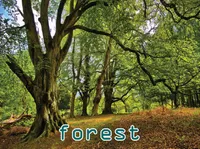
English vocabulary and phrases on Mid-Autumn Festival
forest means . Learn how to pronounce and use forest through vivid examples and easy-to-understand exercises.

Okay, let's break down how to pronounce "forest" in English. It's a tricky one for some learners! Here's a breakdown:
The most common and accepted pronunciation is:
Let's break that down syllable by syllable:
Putting it together, it's roughly: "FOR-ist"
American English pronunciation is slightly different:
The main difference:
Here are some helpful tips:
To help me give you even more tailored advice, could you tell me:
Let's break down how to use the word "forest" in English. It's a wonderfully versatile word!
As a Noun (the most common use):
As a Verb (less common, but possible):
Resources for Further Learning:
To help me give you even more targeted advice, could you tell me:
Complete the following sentences with the most appropriate word.
Select all correct answers for each question.
A vast expanse of trees, typically wild and extensive, is primarily referred to as a: (a) prairie (b) forest (c) tundra (d) swamp (e) meadow
Which of the following terms are often used interchangeably or in close relation to 'forest' when discussing large natural areas of trees? (a) woodland (b) desert (c) jungle (d) meadow (e) park
The local authorities have launched a campaign to re-plant trees in the degraded _______ areas after the wildfire. Which terms would be appropriate to fill the blank? (a) forested (b) urban (c) barren (d) woodland (e) agricultural
A small group of trees, often planted or growing naturally in a particular area, might be called a: (a) thicket (b) tundra (c) grove (d) marsh (e) savanna
Which of these terms describes a large, open area of grassland, often found in tropical or subtropical regions? (a) steppe (b) taiga (c) savanna (d) rainforest (e) prairie
Rewrite the following sentences as instructed.
Original: The large area covered with dense trees and undergrowth provides habitat for various wildlife species.
Original: Logging operations have significantly reduced the amount of tree-covered land in the region.
Original: We went for a long hike through the trees and discovered a hidden waterfall.
Exercise 1:
Exercise 2:
Exercise 3:

English vocabulary and phrases on Mid-Autumn Festival

Tips to improve vocabulary in communication

English vocabulary by topic: Clothes

The secret to remembering all 50 English vocabulary words every day easily

English vocabulary by topic: Human body

Vocabulary of the most popular subjects in English

Learn English about Covid: All about vocabulary and disease prevention

Vocabulary of Subjects in English

Set of 60 English vocabulary on educational topics

Vocabulary - just a small thing!
Comment ()